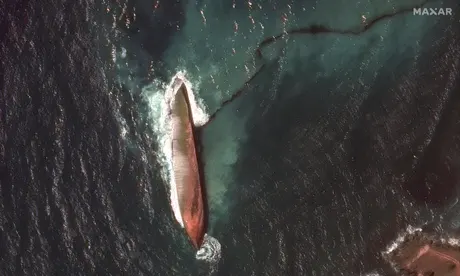Scientists have warned that decaying oil and gas pipelines left to fall apart in the North Sea could release large volumes of poisons such as mercury, radioactive lead and polonium-210, notorious for its part in the poisoning of Russian defector Alexander Litvinenko.
Mercury, an extremely toxic element, occurs naturally in oil and gas. It sticks to the inside of pipelines and builds up over time, being released into the sea when the pipeline corrodes.
Some methylmercury, the most toxic form of the metal, is released by the pipelines although other forms can be converted into it. The international Minamata convention on mercury states that high levels in dolphins, whales and seals can lead to “reproductive failure, behavioural changes and even death”. Seabirds and large predatory fish such as tuna and swordfish are also particularly vulnerable.
Lhiam Paton, who is a researcher from the Institute for Analytical Chemistry at the University of Graz who has raised the alarm over the mercury pollution was quoted as saying that “even a small increase in mercury levels in the sea will have a dramatic impact on the animals at the top of the food web”.
Read also: NCCC to tackle climate change, deforestation in Katsina
According to available data, there are about 27,000km (16,800 miles) of gas pipelines in the North Sea, and scientists predict the amount of the metal in the sea could increase anywhere from 3% up to 160% from existing levels. In some countries, such as Australia, companies are required to remove them when the oil well stops operating. But in the North Sea companies are allowed to leave them to rot away.
Paton, whose work is published in the Journal of Hazardous Materials, said that pipelines left on the seabed may be holding onto considerable amounts of mercury which is waiting to be released into the local marine environment if the pipelines are left to corrode away as they are after decommissioning.
“There is no way to predict the impact of this right now but we do know that the bioaccumulation of mercury within the marine food web is already dramatic and an increase in oceanic mercury concentrations will only come with downsides,”he said.
Effects on wildlife and food chains will depend on the form of mercury released from the decaying pipelines, with some forms much less likely to be taken up by marine life than others.
According to Dr Darren Koppel, a research scientist from the Australian Institute of Marine Science, it is unlikely that all the mercury released from a corroded pipeline will end up in seawater. The “mercury is more likely to partition between the sediments, water, biota and atmosphere, adding to the global mercury cycle”.
Story was adapted from the Guardian.
